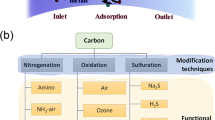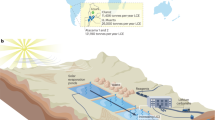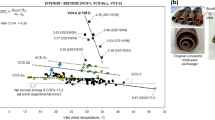Abstract
DAVIES1 has studied the thermal decomposition of a bituminous coal, and has laid particular emphasis on the heat flux to the coal particles. Individual spheres of coal were suspended from a recording balance in a stream of hot nitrogen. To begin with, the weight record showed a constant rate of loss and in the final part the rate of weight loss decreased with time. The initial constant rate of weight loss was found to be directly proportional to the heat flux and was zero at about 400° C.
This is a preview of subscription content, access via your institution
Access options
Subscribe to this journal
Receive 51 print issues and online access
$199.00 per year
only $3.90 per issue
Buy this article
- Purchase on Springer Link
- Instant access to full article PDF
Prices may be subject to local taxes which are calculated during checkout
Similar content being viewed by others
References
Davies, W. B. thesis, Univ. Sheffield (1966).
Kallend, A. S., and Nettleton, M. A., Erdöl und Kohle, 5, 354 (1966).
Rowe, P. N., Claxton, K. T., and Lewis, J. B., Trans. Inst. Chem. Eng., 43, T14 (1965).
Peters, W., thesis, Univ. Aachen (1963).
Author information
Authors and Affiliations
Rights and permissions
About this article
Cite this article
DAVIES, W., BROWN, D. Mechanism of Coal Decomposition. Nature 213, 64–65 (1967). https://doi.org/10.1038/213064a0
Received:
Issue Date:
DOI: https://doi.org/10.1038/213064a0
Comments
By submitting a comment you agree to abide by our Terms and Community Guidelines. If you find something abusive or that does not comply with our terms or guidelines please flag it as inappropriate.



